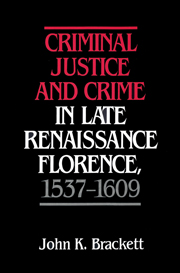Book contents
- Frontmatter
- Contents
- Acknowledgments
- Introduction
- 1 The bureaucratic structure of the Otto: the personnel and their functions
- 2 Financing the Otto
- 3 The Otto as police: organization and function
- 4 Criminal procedure before the Otto: from discovery to sentencing
- 5 The Otto and its role in the centralization of criminal justice in the Florentine state
- 6 Crime and criminals
- Conclusion
- Appendix 1 Names of other officers of the Otto di Guardia e Balìa, 1537–1609, as we have them
- Appendix 2 Budget totals by year
- Appendix 3 Comparison of detailed average expenditures for budgets, 1537–1547 and 1598–1609
- Appendix 4 Occupation key
- Bibliography
- Index
5 - The Otto and its role in the centralization of criminal justice in the Florentine state
Published online by Cambridge University Press: 05 September 2009
- Frontmatter
- Contents
- Acknowledgments
- Introduction
- 1 The bureaucratic structure of the Otto: the personnel and their functions
- 2 Financing the Otto
- 3 The Otto as police: organization and function
- 4 Criminal procedure before the Otto: from discovery to sentencing
- 5 The Otto and its role in the centralization of criminal justice in the Florentine state
- 6 Crime and criminals
- Conclusion
- Appendix 1 Names of other officers of the Otto di Guardia e Balìa, 1537–1609, as we have them
- Appendix 2 Budget totals by year
- Appendix 3 Comparison of detailed average expenditures for budgets, 1537–1547 and 1598–1609
- Appendix 4 Occupation key
- Bibliography
- Index
Summary
To measure the effectiveness of the statewide administration of criminal justice by the Medici is to prove an important dimension of the kind of political authority that we define as absolutist. We must ask whether the princes exercised a monopoly over the kind of coercive authority necessary to discipline all of their subjects equally. Did they even desire to possess this kind of power? The preceding chapters established that in Florence the administration of justice centered on the activity of the Otto di Guardia. We also outlined the structure of the policing relationship that existed between the city and its subject territory, as well as the role of the Eight, the captain of the Bargello, the bargelli of the countryside, and the two prisons operated by the city. Although the system did come under the central direction of the princes, the financial restraints enforced by the Medici clashed with their ultimate goal – to make a profit. An unpredicted degree of flexibility was the result. In other words, the grand duchy did not have enough centralized control over criminal justice to be considered an absolutist state. The first support for this conclusion comes from the necessity to exclude from discussion feudal jurisdictions, which maintained their own judicial systems, and the Sienese state, where, in our period, the Otto had no authority.
Antonio Anzilotti attempted a comprehensive analysis of the role of the Eight in the centralization process initiated by Cosimo I.
- Type
- Chapter
- Information
- Publisher: Cambridge University PressPrint publication year: 1992



